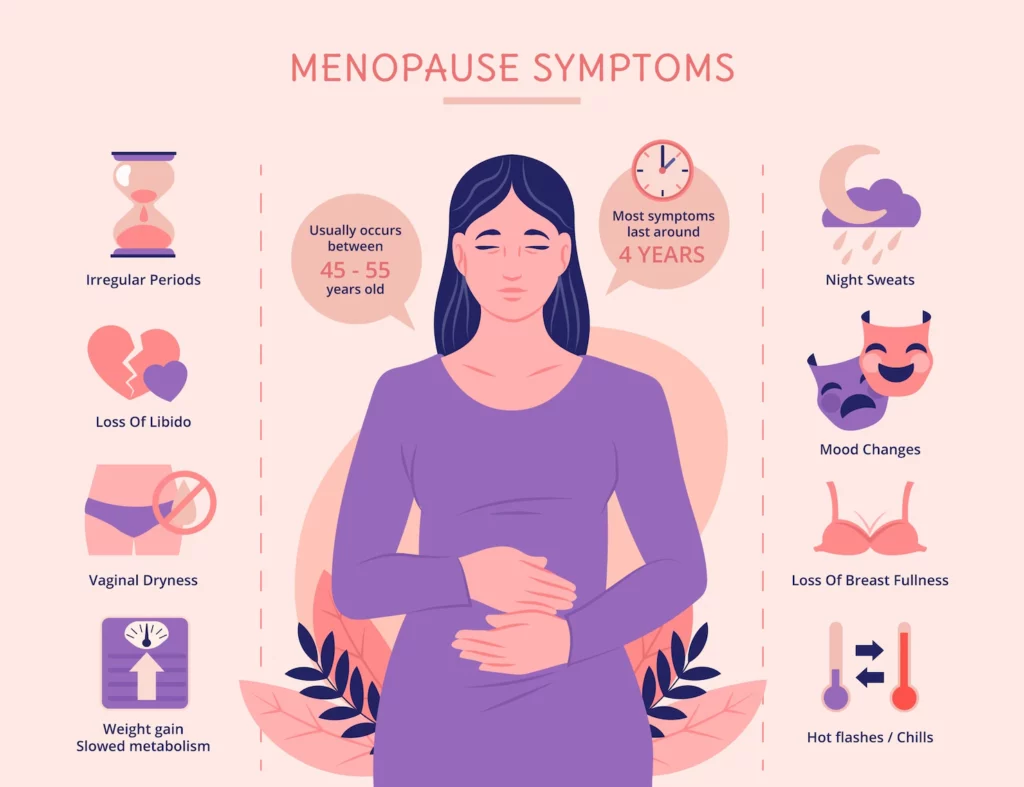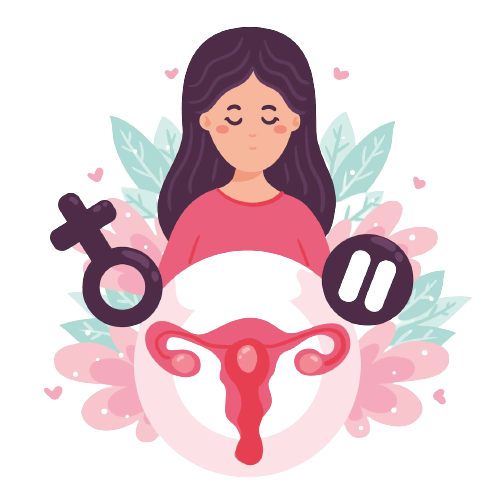What is Menopause?
Menopause is a point in time when you’ve gone 12 consecutive months without a menstrual cycle. The time leading up to menopause is called perimenopause. This is when a lot of women or people assigned female at birth (AFAB) start to transition to menopause. They may notice changes in their menstrual cycles or have symptoms like hot flashes. Get Menopause Treatment.
What are the three stages of menopause?
- Perimenopause or “menopause transition”
- Menopause
- Postmenopause

What are the signs of menopause?
You may be transitioning into menopause if you begin experiencing some or all of the following symptoms:
Night sweats
Drenching night sweats are common during menopause. Night sweats that occur alongside other symptoms may be a sign of an infection, diabetes, or cancer.
Vaginal dryness
Vaginal dryness is a painful symptom that many people may experience at some point during their lives. This symptom can be caused by a decrease in hormone levels, breastfeeding or certain medications.
Urinary urgency
Urgent urination is a sudden, strong need to urinate. This causes a discomfort in your bladder. Urgent urination makes it difficult to delay using the toilet.
Difficulty in sleeping
Many women experience sleep problems during perimenopause, the period of time before menopause when hormone levels and menstrual periods become irregular.
Premenstrual syndrome (PMS)
Premenstrual syndrome is a combination of symptoms that arrive before your period. Your symptoms may primarily be physical (bloating, fatigue, etc.), emotional (irritability, sadness, etc.) or a combination of both.
Irregular periods
Menstrual periods typically last four to seven days and occur roughly every 28 days. Examples of irregular periods include periods that occur fewer than 21 days or more than 35 days apart, missing three or more periods in row.
Why does menopause happen?
When menopause happens on its own (natural menopause), it’s a normal part of aging. Menopause is defined as a complete year without menstrual bleeding, in the absence of any surgery or medical condition that may cause bleeding to stop such as hormonal birth control, radiation therapy or surgical removal of your ovaries.
As you age, your reproductive cycle begins to slow down and prepares to stop. This cycle has been continuously functioning since puberty. As menopause nears, your ovaries make less of a hormone called estrogen. When this decrease occurs, your menstrual cycle (period) starts to change. It can become irregular and then stop.
Physical changes can also happen as your body adapts to different levels of hormones. The symptoms you experience during each stage of menopause (perimenopause, menopause and postmenopause) are all part of your body’s adjustment to these changes.


Can menopause be treated?
Menopause is a natural process that your body goes through. In some cases, you may not need any treatment for menopause. When discussing treatment for menopause with your provider, it’s about treating the symptoms of menopause that disrupt your life. There are many different types of treatments for the symptoms of menopause. The main types of treatment for menopause are:
- Hormone therapy.
During menopause, your body goes through major hormonal changes — decreasing the amount of hormones it makes. Your ovaries produce estrogen and progesterone. When your ovaries no longer make enough estrogen and progesterone, hormone therapy can make up for lost hormones. Hormone therapy boosts your hormone levels and can help symptoms like hot flashes and vaginal dryness. It can also help prevent osteoporosis.
- Nonhormonal treatments.
Though hormone therapy is a very effective method for relieving menopause symptoms, it’s not the perfect treatment for everyone. Nonhormonal treatments include changes to your diet and lifestyle.
Get in touch with our team
Specialised care from the best team of doctors along with a widely trusted high risk pregnancy specialist in Pune. Sail smoothly through high risk pregnancies. Get Menopause Treatment Today.